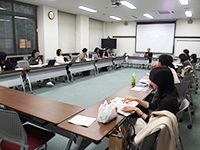On November 9th, we welcomed Dr. Denise M. Horn, Dr. Linda Hasunuma, and Dr. Mary M. McCarthy and held two presentations on the topic of “Geopolitics, Security, and Women’s Bodies.” The Organizer and moderator was Prof. Ki-young Shin. Dr. Denise M. Horn presented an analysis of changes in population control policy of Indonesia from the global geopolitical perspective. She elaborated layered effects of power in the population control, promoted through development aid of the USA and Japan under the Cold War logic of containment of communist threats, and forced upon women’s bodies by Indonesian nationalism. It is also interesting that the figure of Kartini, “the first Indonesian feminist” who resisted patriarchy under Dutch colonial rule, was actively used as the maternal symbol in this process. Dr. Horn pointed out that after the collapse of the Cold War structure, the emphasis of global population control changed to “empowerment of women,” and despite the democratization of Indonesia, control of women’s bodies continued in a different form. Her analysis highlighted the complex relationship between global, national, and local powers interfering with women’s bodies. Dr. Linda Hasunuma and Dr. Mary M. McCarthy reported on ongoing research about the movement in the USA for memorializing Japan’s “comfort women.” Since the 2007 House Resolution by the United States House of Representative that demanded a Japanese apology, movements by the USA have shifted to local activities through monuments in public spaces. On the basis of detailed interviews conducted in multiple cities, Dr. Hasunuma and Dr. McCarthy revealed that though the presence of the Korean community is an important element, cooperation of diverse Asian communities, and appeals to universal values such as human rights and justice were key to convincing people on the significance of memorializing “comfort women” in public spaces. This movement works through diverse and creative educational and cultural programs to involve not only people of Asian ethnicity but also the younger generation. A monument that was built in New Jersey through the initiative of two high school students and international movements aiming to register monuments with the UNESCO Memory of the World are interesting cases of new developments. In the discussion, Ms. Keiko HIRANO, who studies migrant domestic workers in Indonesia, highlighted that the nationalism demanding women to play the traditional role of mothers is supported by the presence of domestic workers, and that Muslim faith was a factor that was later introduced into this ideal image of women. Dr. Akwi SEO, who is studying social movements among Korean women living in Japan, talked about a Korean women’s group in Canada, which was tackling domestic violence issues but did not receive support from the community and also discussed the experience of Korean women residing in Japan, who themselves became involved with activities to memorialize “comfort women” in the USA. She questioned how women, who are “minorities within minorities” in a heterogeneous community of minorities, tackled their own identifies and feminist issues. Ms. Hisako MOTOYAMA, who is studying gender mainstreaming in the field of international security, identified that the emphasis on universal values by the “comfort women” movement could mask the role of the USA suppressing these memories during the Cold War, and that the new geopolitics that appeared after the Cold War could depoliticize universal values, facilitating their use by the authorities. Other participants asked many questions, leading to lively discussions.





